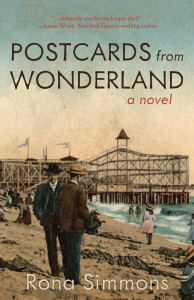Guest Post: Author Rona Simmons Explores How Bad Book Reviews Can Help Writers
 Authors often tell each other: do not read reviews. The reviews that rave about your book go to your head. The reviews that pan your book go straight to your heart. No good comes from either. But author Rona Simmons has another thought. What if we used bad reviews to challenge ourselves? To figure out what works and what doesn’t? What if some of those bad reviews had something valid to say? It’s an interesting thought — and Rona has some great tips and examples below.
Authors often tell each other: do not read reviews. The reviews that rave about your book go to your head. The reviews that pan your book go straight to your heart. No good comes from either. But author Rona Simmons has another thought. What if we used bad reviews to challenge ourselves? To figure out what works and what doesn’t? What if some of those bad reviews had something valid to say? It’s an interesting thought — and Rona has some great tips and examples below.
Please welcome Rona Simmons back to WFW, and share your thoughts in the comments.
Amy xo
Our Love/Hate Relationship With Books
Can understanding what readers “hate” improve your writing?
by Rona Simmons
 Have you ever wondered what it takes for a book to make a best seller list���whether New York Times, Barnes and Noble, or Amazon?�� I have.�� I thought an understanding of what sets best sellers apart would lead me to the “secret sauce” that captures readers and keeps them reading to the last word.�� But, after perusing several best seller lists, I found myself bleary eyed, empty handed, and still searching for the magic ingredient.
Have you ever wondered what it takes for a book to make a best seller list���whether New York Times, Barnes and Noble, or Amazon?�� I have.�� I thought an understanding of what sets best sellers apart would lead me to the “secret sauce” that captures readers and keeps them reading to the last word.�� But, after perusing several best seller lists, I found myself bleary eyed, empty handed, and still searching for the magic ingredient.
Until that moment, I’d given little thought to the other side of the coin.�� What books do readers dislike and why?�� Why do they lose interest after reading a few pages or even most of the story?�� Why do some develop such strong dislike they rush to post a scathing review and anoint the object of their loathing with a devastating, single star?
Did a list of “books readers hate” even exist?�� It did.�� In fact, contrary to what I thought, finding one was easy.�� But once again the lists alone provided little instruction.�� They included obscure, poorly written works and works forced on readers at an early age.�� Much like the green peas they had to finish before leaving the dinner table, those readers hated them still.
I returned to the list of best sellers, a new approach in mind.
Insights from “one star” ratings
I paged through one of the best seller’s many reviews, tapping at full click speed.�� Past the Amazon.com five-star ratings.�� Past the four star-ratings.�� Then, at the three stars, my cursor hovered.�� I read a handful of “it was okay” entries.�� The samples seemed timid, the readers’ comments too polite or too fearful of expressing an honest opinion.�� I paged down, going deeper and deeper until my PC binged.�� I’d hit bottom.
The number of one-star reviews was surprising.�� The same held true for the next womens fiction title on my list and the one after that.�� Hundreds of one-star ratings and in one or more instances, thousands, sullied each book’s reputation.�� Some, to be sure, were hate mail.�� One writer denigrating another’s work, I asked myself?�� To what gain, I could not imagine.
After compiling, sorting, grouping, and tallying the comments, I found the reasons for low ratings fell into five groups.�� In rough order of the number of mentions, they were:
������������ Characters:�� one dimensional, stereotypical, or wimpy women, protagonists with whom the reader did not identify, or stories with too many characters to follow
������������ Plot:�� unrealistic plots with far too many coincidences, predictable plots, or stories that jumped back and forth in time
������������ Skill:�� poor writing, sloppy editing���editing that failed to catch spelling, grammatical, or punctuation errors, anachronisms, unintended repetition, and factual inaccuracies
������������ Style: ��most often, the offense was dense writing, prose containing too much description or so much description the story became secondary or even irrelevant
������������ Series:�� works failing to meet the standard of earlier works in a series, or works retelling too much from earlier editions
Lessons learned:�� whatever book I love is on someone else’s hate list
The insights were to some extent merely the inverse of what experts suggest produce a good book.�� No surprise there.�� But then, a few titles on the “books we hate” list were books I had read and rated four or five stars.�� That too should not have surprised me.�� Like most things in life, I had learned, there are two sides to the coin or story.
Consider the books you’ve lost interest in or left unfinished or, perhaps, rated poorly.�� What did you find to be the culprit and how can that knowledge improve your writing?
 Rona Simmons’ new novel, Postcards from Wonderland, is the story a young woman who comes face-to-face with a Prohibition era mob boss in a fight to save her husband’s dreams, her marriage, and even her own life.�� The book is due out in March from Deeds Publishing and though she’s waist-deep in promotional activities with the launch, Rona’s already talking about a third novel and looking forward to reading her five star reviews.
Rona Simmons’ new novel, Postcards from Wonderland, is the story a young woman who comes face-to-face with a Prohibition era mob boss in a fight to save her husband’s dreams, her marriage, and even her own life.�� The book is due out in March from Deeds Publishing and though she’s waist-deep in promotional activities with the launch, Rona’s already talking about a third novel and looking forward to reading her five star reviews.
website:��http://www.ronasimmons.com/;
blog:��http://womenatword.wordpress.com;
twitter:��http://twitter.com/rona_simmons
facebook:��http://www.facebook.com/pages/Rona-Simmons-Writer-and-Author

Women's Fiction Writers
- Amy Sue Nathan's profile
- 543 followers



